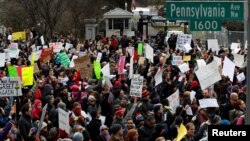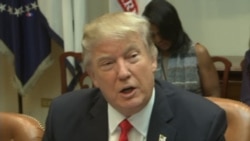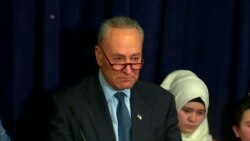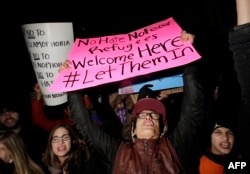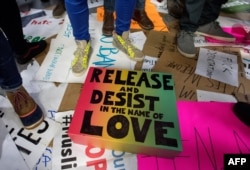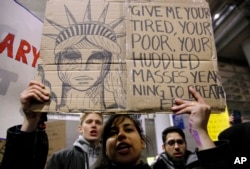U.S. President Donald Trump has continued to defend his executive order banning entry to refugees and people from seven Muslim-majority countries, while rights groups vowed to keep pressing legal action, thousands of people protested in cities across the country and Democrats prepared to issue legislation to block the ban.
In a series of tweets Monday morning, Trump said Department of Homeland Security Secretary Gen. John Kelly told him that "all is going well with very few problems." He added that "big problems at airports" were caused by a computer outage that hit Delta airlines, protesters and "the tears of" Senate Minority leader Chuck Schumer.
WATCH: Trump defends his executive order, criticizes Schumer
Schumer appeared to hold back tears as he called Sunday for Trump to overturn the executive order.
WATCH: Schumer's emotional response to immigration ban
The order, signed Friday, includes a 120-day suspension of refugee admissions and a 90-day entry ban for people from Iraq, Iran, Syria, Somalia, Sudan, Libya and Yemen.
The implementation led to confusion, particularly at the nation's airports, where in some cases people holding green cards as permanent legal residents were detained for extra questioning before being allowed entry.
Homeland Security Secretary Kelly issued a statement Sunday seeking to clarify the policy, saying he deems "the entry of lawful permanent residents to be in the national interest."
State Department memo
On Monday, State Department employees and U.S. diplomats opposed to Trump’s order circulated a "Dissent Channel memo" that said the administration’s move "will not achieve its aims and will likely be counterproductive."
The State Department says it it aware of the memo. "The Dissent Channel is a longstanding official vehicle for State Department employees to convey alternative views and perspectives on policy issues. This is an important process that the acting secretary, and the department as a whole, value and respect," said acting spokesman Mark Toner.
The Dissent Channel was established decades ago to allow American diplomats to speak freely about foreign policy matters.
When employees feel their voices are not heard by supervisers and they use the Dissent Channel, the secretary of state’s policy planning staff is supposed to review it, circulate it to authorized people and respond to the drafters.
In a separate statement Sunday, the Department of Homeland Security said the government retains its right to revoke visas at any time for reasons of national security. That followed an emergency order by federal court in New York temporarily barring the deportation of people who arrive at U.S. airports with a valid visa or an approved refugee application.
Judge Ann Donnelly wrote, "There is imminent danger that, absent the stay of removal, there will be substantial and irreparable injury to refugees, visa-holders, and other individuals from nations" who are subject to the president's order.
Trump has repeatedly called for stricter screening of refugees. The senior administration official who briefed reporters Sunday described the previous system as "woefully inadequate."
Under President Barack Obama's administration, refugees were required to undergo security checks, including strict vetting by law enforcement and intelligence agencies, and extensive interviews before they were allowed into the country. For many refugees, the process took up to two years to complete.
More reaction
Nihad Awad, executive director of the Council on American-Islamic Relations, told VOA's Urdu service Trump's order goes against the values of Americans who have historically welcomed those fleeing persecution and war.
"Donald Trump did not convince any of us that he has sound legal or national security concerns. For example, the Syrian refugees are subjected to at least two years of scrutiny and extreme vetting already, and once they come here they are safe, they are vetted. There is no terrorist attack that happened at the hands of a Syrian refugee, or any refugee, that we know," Awad said. "So for him to base all his executive order on [that] false notion is un-American, unethical."
The 57-nation Organization of Islamic Cooperation said Monday that Trump's action will further complicate the challenges refugees face.
"Such selective and discriminatory acts will only serve to embolden the radical narratives of extremists and will provide further fuel to the advocates of violence and terrorism at a critical time when the OIC has been engaged with all partners, including the U.S., to combat extremism and terrorism in all their forms and manifestations," said an OIC statement.
All seven countries featured in the executive order are OIC members.
The text of the order cites the September 11, 2001, terror attacks that killed nearly 3,000 people in the U.S., but does not apply to Saudi Arabia, where most of the hijackers involved were from.
Iran, Syria and Sudan are on the State Department's list of state sponsors of terrorism, while Iraq, Libya, Yemen and Somalia are listed as terrorist safe havens.
Senior Republican U.S. Senators John McCain and Lindsey Graham, who are members of the Senate Armed Services Committee, criticized Trump's order Sunday, saying the confusion at airports showed the measure was "not properly vetted."
"We are particularly concerned by reports that this order went into effect with little to no consultation with the Departments of State, Defense, Justice and Homeland Security," they said in a joint statement. "Such a hasty process risks harmful results."
Trump responded on Twitter, calling McCain and Graham "weak on immigration" and saying they should be focused on Islamic State, illegal immigration and border security.
State Department correspondents Steve Herman, Nike Ching, and reporters Mohamad Olad, James Butty and Saqib Islam contributed to this report




